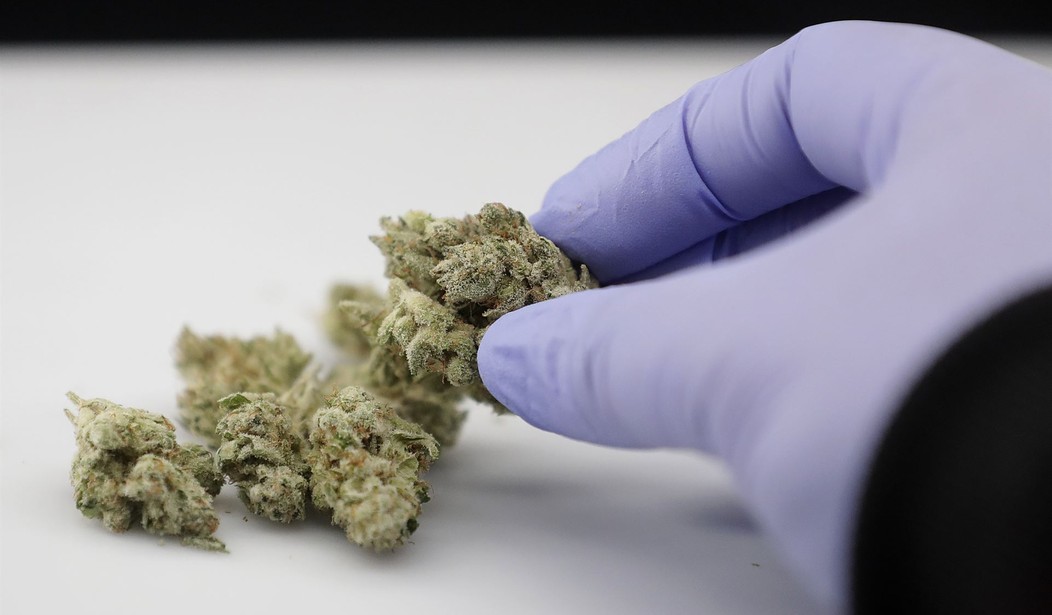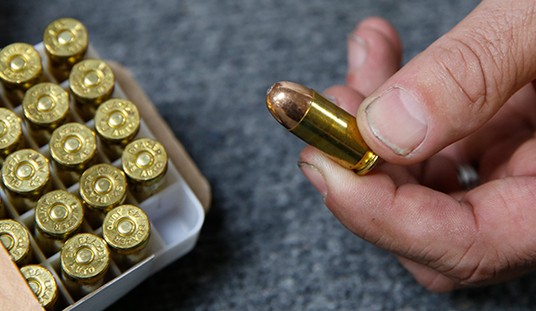Though marijuana possession and use has been decriminalized or legalized to one degree or another in about 40 states, it remains illegal under federal law, and that means that anyone caught with both is likely to face charges. But a federal judge in Oklahoma has ruled that a man arrested and charged with violating 18 U.S.C. § 922(g)(3) was correct when he argued that the statute is unconstitutionally vague and violates his rights under the Second Amendment.
Jared Michael Harrison was on his way to work at a medical marijuana dispensary in Lawton, Oklahoma last May when he was pulled over for allegedly running a red light. Officers said they smelled pot in his vehicle and ended up searching the car after spotting an ankle monitor on Harrison, who was under indictment in Texas at the time for aggravated assault. During the search they discovered a revolver along with a couple of joints, some THC gummies, and a some vape cartridges. Harrison was arrested on state charges, but a few months later a federal grand jury returned an indictment alleging that he had violated 18 U.S.C. § 922(g)(3) by possessing both a firearm and weed.
Harrison has not yet gone to trial on those charges, and on Friday U.S. District Judge Patrick Wyrick ruled that a trial shouldn’t take place because the statute in question is unconstitutional.
Many people are at least vaguely familiar with the idea that convicted felons can’t possess a firearm. 18 U.S.C. § 922(g)(1) is the federal statute making such firearm possession unlawful, and prosecutions under that subsection make up the overwhelming majority of prosecutions brought under § 922 (about 79%). But § 922 contains many lesser-known provisions that prohibit other classes of people from possessing or receiving a firearm. 18 U.S.C. § 922(g)(3), the prohibition at issue here, for example, prohibits possession of firearms by users of substances made unlawful by the federal Controlled Substances Act. It is rarely used by prosecutors, as it accounts for only about 5% of prosecutions brought under § 922.
Section 922(g)(3) does not have deep roots; it wasn’t enacted by Congress until the Gun Control Act of 1968. The statute initially prohibited any individual who was “an unlawful user of or addicted to marihuana or any depressant or stimulant drug . . . or narcotic drug” from receiving a firearm, but it was amended in 1986 to broadly prohibit the receipt or possession of a firearm by any person who “is an unlawful user of or addicted to any controlled substance (as defined in section 102 of the Controlled Substances Act (21 U.S.C. 802)).” In its modern form, § 922(g)(3) thus strips a person of their fundamental right to possess a firearm the instant the person becomes an “unlawful user” of marijuana. And in the United States’ view, all users of marijuana are “unlawful users.”
…
The question here is thus whether stripping someone of their right to possess a firearm solely because they use marijuana is consistent with the Nation’s historical tradition of firearm regulation. If it is not, then § 922(g)(3) cannot be constitutionally applied to Harrison—no matter the reasonableness of the policy it embodies.
…
No one disputes that Harrison is an American citizen who has resided in the United States his entire life, which under Supreme Court precedent would make him part of the “national community,” and thus part of “the people” to whom the Second Amendment guarantees the right to keep arms. The United States argues, however, that marijuana users are lawbreakers, and lawbreakers aren’t part of “the people” whose rights are protected by the Constitution. But this is precisely the sort of carving out of a subset from “all Americans” that the Heller Court rejected.
Moreover, the United States’ approach shoehorns the government’s historicaltradition burden onto Bruen’s initial presumption, a presumption based simply on the Second Amendment’s plain text. Indeed, as support for excluding marijuana users from “the people,” the government relies on a purported historical tradition of regulating firearm use by felons, intoxicated persons, and the mentally ill. But Bruen makes clear that the first step is one based solely on the text of the Second Amendment to determine if it presumptively protects an individual’s conduct—a presumption that the United States can then rebut with history and tradition. Here, because the Second Amendment’s plain text covers Harrison’s conduct—possessing a handgun for self-defense—“the Constitution presumptively protects that conduct.”
Wyrick says that since Harrison’s possession of a firearm is presumptively protected by the Second Amendment, it’s up to the federal government to prove that there are historical analogues to § 922(g)(3) that would demonstrate its compatibility with the Constitution. And in Wyrick’s opinion, the DOJ simply failed to do so. While the Justice Department could find at least seven colonial, state, and territorial laws between 1655 and 1899 that it claims “categorically prohibited” intoxicated individuals from possessing firearms, Wyrick pointed out that each one of those statues merely prohibited possessing a gun while someone was actively intoxicated, not possessing both firearms and alcohol. The judge further noted that each of the laws cited by DOJ also applied to possessing a firearm in a public place, not a home or private property.
Where the seven laws the United States identifies took a scalpel to the right of armed self-defense—narrowly carving out exceptions but leaving most of the right in place—§ 922(g)(3) takes a sledgehammer to the right. Recall that § 922(g)(3) imposes the most severe burden possible: a total prohibition on possessing any firearm, in any place, for any use, in any circumstance—regardless of whether the person is actually intoxicated or under the influence of a controlled substance.39 It is a complete deprivation of the core right to possess a firearm for self-defense, turning entirely on the fact that an individual is a user of marijuana. Section 922(g)(3)’s “burden on the right of armed self-defense” is thus not “comparable” to the seven historical intoxication laws.
DOJ also argued that felon-in-possession laws are substantially similar to § 922(g)(3), but Wyrick disagreed, pointing out that under the standard proffered by the government’s attorneys, virtually any violation of the law, no matter how minor, would be cause enough to deprive someone of their right to keep and bear arms for the rest of their lives.
Imagine a world where the State of New York, to end-run the adverse judgment it received in Bruen, could make mowing one’s lawn a felony so that it could then strip all its newly deemed “felons” of their right to possess a firearm. The label “felony” is simply “too easy for legislatures and prosecutors to manipulate.”
Remarkably, when presented with this lawn-mowing hypothetical argument, and asked if such an approach would be consistent with the Second Amendment, the United States said “yes.” So, in the federal government’s view, a state or the federal government could deem anything at all a felony and then strip those convicted of that felony—no matter how innocuous the conduct—of their fundamental right to possess a firearm. Why? Because courts must defer to a legislature’s judgments about what is and is not a felony, says the United States. It’s as if Bruen’s command regarding the inappropriateness of such deference to legislative judgments has been lost in translation.
In a sense, one must applaud the United States for its steadfast commitment to its legal position. But “giv[ing] legislatures unreviewable power to manipulate the Second Amendment by choosing a label” is inconsistent with the entire point of constitutionalizing a fundamental right in the first place: to restrain a legislature’s ability to infringe that right through legislation. What would remain of the Second Amendment if the Court were to accept the United States’ view that a legislature could prohibit the exercise of the right it protects simply by declaring anything or everything a felony? Nothing. Maybe that is what the federal government desires, but it is hardly what the Constitution requires.
Even though Harrison is not a convicted felon, Wyrick’s opinion casts doubt on the current gun laws that strip all those convicted of a felony of their right to bear arms. Echoing the Fifth Circuit Court of Appeals’ recent decision striking down a statute that bars gun possession for those subject to a domestic violence restraining order, Wyrick argued that the proper historical determination for prohibiting those convicted of a crime from possessing a firearm is their relative “dangerousness”, not merely an adjudication of guilt to whatever charge they might have been facing. And Wyrick notes that in Harrison’s case, there were other, more constitutionally sound, avenues for the government to use if it wanted to disarm Harrison under the law.
None of this is to say that the government cannot play a role in protecting the public from dangerous persons possessing firearms. It can, and it should. For example, if the State of Texas thought that Harrison’s alleged involvement in a shooting demonstrated that Harrison was a danger to the public, it could have demonstrated to a Texas judge—in an individualized proceeding of which Harrison would have been given notice and the opportunity to be heard—that Harrison ought to be jailed while awaiting trial for that shooting. The Constitution, after all, permits pre-trial detention, and such detention would be a highly effective means of furthering the government’s interest in protecting the public from a gun-toting Harrison. But that didn’t happen; Harrison was released pending trial in Texas. And so here we are, with the federal government now arguing that Harrison’s mere status as a user of marijuana justifies stripping him of his fundamental right to possess a firearm. For all the reasons given above, this is not a constitutionally permissible means of disarming Harrison.
Merrick Garland says he’ll appeal this decision, and it’s important to note that Wyrick’s decision applies only to Harrison’s case, at least for now. If the Tenth Circuit Court of Appeals upholds the decision then it would apply to gun owners in Oklahoma, Kansas, New Mexico, Colorado, Wyoming, and Utah, but for the moment the feds will continue to enforce Section 922(g)(3) whenever and wherever it can.









Join the conversation as a VIP Member